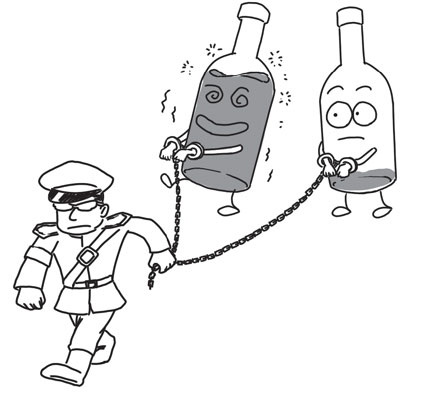New drunk driving law poses tough questions
|
|
|
[By Zhou Tao / Shanghai Daily] |
Drunk driving as a societal headache has added new meaning, pitching one powerful government agency against another - and they are both part of the law enforcement apparatus.
The Eighth Amendment to the Criminal Code, which was recently enacted by the People's Congress and went into effect on May 1, includes an article that makes drunk driving a criminal offense.
Since then, hundreds of drunk drivers have been rounded up by the police across the country, including celebrity musician Gao Xiaosong, who received a 6-month sentence last week.
Court's voice
Perhaps overwhelmed by the torrent of new cases filling court dockets, a Supreme People's Court vice president recently came out and said that the part in the Eighth Amendment pertaining to drunk driving should not be interpreted literally, and its indictment and conviction should be considered in conjunction with the criminal offense definition as stipulated in the general section of the original Criminal Code, which I shall describe in detail later.
In other words, not all drunk driving cases should be automatically regarded as a criminal offense, and care should be exercised in each case. The Ministry of Public Security immediately came out with a resounding rebuttal. "We are going to vigorously go after every drunk driver and bring them to justice," the Ministry's spokesperson said.
A fight between the court and the police? That is rare in China, and not surprisingly stoked a spirited, heated and, in some cases, bitter public discourse. Both sides seem to have valid points.
The Supreme People's Court's camp takes a legalistic approach and seems to have the support of the legal community, while the Ministry of Public Security seems to win more populace votes, who think that creating exceptions to drunk driving criminalization waters down the newly passed law and opens up bribery and corruption opportunities, essentially serving as a free pass to drunk drivers who are wealthy or well-connected.
The debate so far has missed one profound issue related to the constitutional right of the Supreme People's Court and its subtle role in adhering to the thin line that separates law enforcement from lawmaking.
For starters, the beginning introductory section of the Eighth Amendment to the Criminal Code explicitly says drunk driving constitutes a criminal offense. Furthermore, its Article 22 spells out in detail the associated penalty for drunk driving:
"Add the following after Article 132 of the Criminal Code to be Article 133: Speed racing on the road when such actions are particularly reckless, or drunk driving, shall be both subject to criminal detention and penalty fines."
So this part of the Eighth Amendment clearly says that drunk driving, whether reckless or not, shall be deemed as a per se criminal offense.
But the problem is that the more general and broader definition of criminal offense is regulated by the general section of the original Criminal Code, which supposedly has overarching power over subsections of the Criminal Code, including subsequent amendments such as the Eighth Amendment at issue here.
And the Supreme People's Court's argument is precisely based on this point, citing Article 13 of the original Criminal Code, which says:
"An action that is significantly insignificant causing little or no harm shall not be deemed as a criminal offense."
So the essence of the problem is: Is there such a thing called drunk driving that is "significantly insignificant causing little or no harm"?
If there isn't, the Supreme People's Court's argument doesn't make sense.
Bad legislation?
On the other hand, if there is, the Eighth Amendment would simply be a bad piece of legislation, as in this case its vague wording would seem to suggest a gross conflict with Article 13 of the original Criminal Code.
And if there is, the legislature should have explicitly added in Article 22 of the Eighth Amendment a condition - "when such actions (meaning drunk driving) are particularly reckless," as they did with respect to speed racing in Article 22.
But then who is entitled to answer this question in the first place, the question of "is there such a thing called drunk driving that is "significantly insignificant causing little or no harm"? I agree with the Supreme People's Court that there are probably indeed situations where drunk drivers cause little or no harm and should not go to jail.
The example given to me by a revered legal scholar is when your loved one has a medical emergency and needs to go to the hospital immediately, and yet you just happen to have gulped down two bottles of beer and can't find a taxi around.
Fair enough.
But what is unfair is that I happened to answer this question on behalf of the legislature. And what is even more unfair is that so did the Supreme People's Court!
Legislators could have classified drunk driving into two categories, if they wanted, those that constitute criminal offense and those that don't, by using the same wording as that for speed racing in the same article.
But the fact of the matter is the legislators chose not to, and categorically criminalized all drunk driving. In fact, when Article 22 of the Eighth Amendment was debated in Congress, this issue was indeed brought up, and legislators insisted on sticking to the current wording.
So here is the dilemma. The Supreme People's Court's position essentially boils down to the need to create another category of drunk driving that is "significantly insignificant causing little or no harm."
But back to the intent of the lawmakers regarding this piece of legislation, they clearly think this is a phantom category; it doesn't exist.
The brawl we see unfolding right now seems on the surface to be between the court and the police, but is in fact between the court and the lawmakers, which brings about an important constitutional question - who is writing law here?
 0
0 







